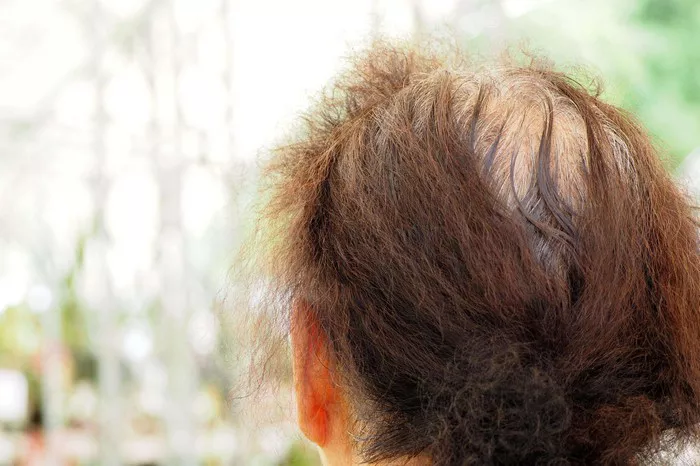Menopause is a natural biological process that marks the end of a woman’s reproductive years. During this transition, hormonal fluctuations can lead to various changes in the body, including changes in hair health. Many women experience hair loss or thinning hair after menopause, which can be distressing and impact their self-esteem. Understanding the causes of hair loss after menopause is essential for women to navigate this phase of life with confidence and seek appropriate solutions. In this comprehensive article, we will explore the factors contributing to hair loss after menopause and discuss effective strategies for managing and promoting hair health during this transformative period.
1. The Subtle Impact of Hormones
Menopause is characterized by a significant decline in the production of female hormones, primarily estrogen and progesterone. These hormones play a crucial role in regulating various bodily functions, including the hair growth cycle. Estrogen, in particular, supports hair health by promoting hair growth and extending the hair’s growth phase (anagen phase). It also helps maintain the hair’s thickness and luster.
As estrogen levels decline during menopause, the delicate balance between hair growth and shedding can be disrupted, leading to hair loss. Additionally, the relative increase in androgen hormones (e.g., testosterone) during menopause can contribute to hair thinning. Androgens can shrink hair follicles and shorten the hair growth phase, resulting in finer and less dense hair.
2. Telogen Effluvium: The Shedding Phase
One of the most common causes of hair loss after menopause is telogen effluvium. This is a type of temporary hair shedding that occurs due to a disruption in the hair growth cycle. Telogen effluvium can be triggered by various factors, including hormonal changes, stress, illness, and certain medications.
During telogen effluvium, a large number of hair follicles enter the resting phase (telogen phase) simultaneously. After a few months, these hairs shed, leading to noticeable hair loss. While telogen effluvium is usually temporary and resolves on its own, it can be concerning for women experiencing hair thinning during menopause.
3. Age-Related Factors
Apart from hormonal changes, age-related factors also contribute to hair loss after menopause. As women age, the rate of hair growth may slow down, and individual hair strands may become finer. The hair follicles may also shrink and produce hair with a shorter growth phase.
Additionally, the production of melanin, the pigment responsible for hair color, decreases with age. This can lead to gray or white hair, which may give the illusion of hair thinning.
4. Genetics and Family History
Genetics plays a significant role in hair health and the likelihood of experiencing hair loss after menopause. If a woman’s family has a history of hair thinning or androgenetic alopecia (female pattern baldness), she may be more prone to hair loss during and after menopause.
Genetic predisposition to hair loss can influence the sensitivity of hair follicles to androgens, making them more susceptible to miniaturization and thinning.
5. Nutritional Deficiencies
Proper nutrition is crucial for maintaining healthy hair, and deficiencies in certain vitamins and minerals can contribute to hair loss. During and after menopause, women may have changes in their dietary habits or absorption of nutrients, which can impact hair health.
For example, iron deficiency (anemia) is common in postmenopausal women and can lead to hair thinning and shedding. Deficiencies in other nutrients like vitamin D, vitamin B12, zinc, and biotin can also play a role in hair loss.
6. Stress and Emotional Impact
Menopause is often associated with various emotional changes, including stress, anxiety, and mood swings. Emotional stress can trigger or exacerbate hair loss conditions such as telogen effluvium.
Moreover, experiencing hair loss after menopause can itself be emotionally distressing, leading to a vicious cycle of stress-induced hair shedding. Managing stress through relaxation techniques, exercise, and seeking emotional support can be beneficial in both coping with menopause and supporting hair health.
7. Medical Conditions and Medications
Certain medical conditions that become more prevalent after menopause, such as thyroid disorders and autoimmune conditions, can contribute to hair loss. Thyroid imbalances can disrupt the hair growth cycle, leading to hair thinning.
Additionally, some medications used to manage menopause symptoms, such as hormone replacement therapy (HRT) or certain medications for other health conditions, may have hair loss as a side effect.
Conclusion
Hair loss after menopause is a common and natural occurrence for many women. Understanding the factors contributing to hair loss during this transformative phase can help women navigate this stage of life with confidence and grace. While hormonal changes and age-related factors play significant roles, addressing nutritional deficiencies, managing stress, and adopting proper hair care practices can support hair health during and after menopause.
If you are concerned about hair loss after menopause, consulting with a healthcare professional or a trichologist can provide personalized guidance and support. Embracing self-care and incorporating effective strategies for hair health can help women maintain a vibrant and healthy head of hair, empowering them to embrace the beauty of this new chapter in life.


